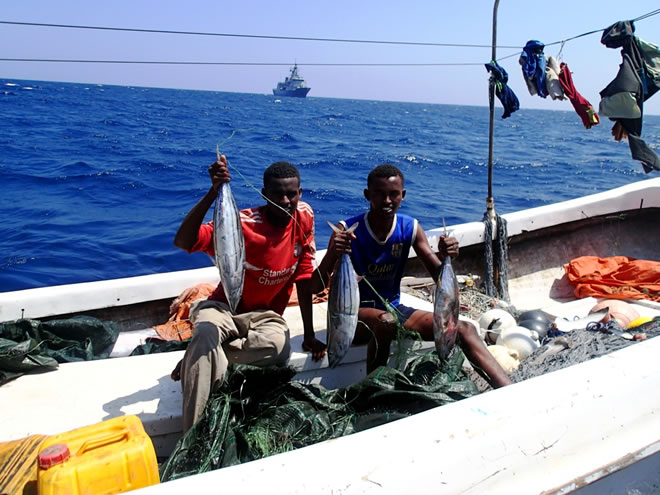

Sunday, March 30, 2014
The database which was carried out on an EU Naval Force warship FS Siroco and Puntland authorities, aims to improve livelihoods in Somalia’s fishing communities.
The new project called the Fishermen Identification Database System, which will provide Puntland’s fishermen with an individual ID card.
By registering its own fishermen, the Puntland authorities will be able to identify who fishes in its waters and to collect essential data to ensure an effective fisheries management and sustainable use of resources. Moreover, it will help to differentiate fishermen from possible piracy suspects.
The project is financed by the Trust Fund to Support the Initiatives of States to Counter Piracy off the Coast of Somalia. Trust Fund donors include EU Member States Germany, the Netherlands, France, the United Kingdom, Italy, Spain and Belgium.
Head of FAO Somalia Luca Alinovi expressed hope that the fisheries database will be used by different stakeholders on land and at sea to allow fisher folks to better access certain areas and for general identification purposes.
Alinovi said in a statement released in Nairobi that Somalia has the longest coast in continental Africa and is one of the richest in fisheries resources.
"That is why I am pleased today that we, by developing this database, are helping Somali fishermen get back into business at sea with few hindrances," he said.
Despite Somalia’s enormous marine resources, the country’s fishing industry remains largely underdeveloped and its fisheries unexploited.
This is partly due to decades of conflict and piracy on the high seas – but also because fish does not form part of the traditional Somali diet.
In the past year, more than 3,000 fishermen, nearly 50 percent of Puntland’s estimated 6,500 fishermen have been registered using a biometrics system that uniquely identifies individuals by their fingerprints background and physical features, according to Jorge Torrens, the fisheries officer managing the project funded under the New York Anti-piracy Trust Fund.
"Through this fisheries database, information related to the fishermen, fish stocks, size communities dependent of fisheries will go a long way in establishing better management measures that ensure the sustainability of the system and hopefully improve counter piracy activities," Torrents said.
The fishermen have been largely impeded from accessing much of the seas due to a surge in piracy attacks on the Indian Ocean and the Gulf of Aden in 2009.
Somalia has a 3,300-kilometer coastline yet her people eat very little seafood and has per capita fish consumption of 2.4 kilograms per year, one of the lowest in the world.
Domestic fresh fish consumption is limited to coastal areas mainly due to poor infrastructure, restricted access to fish, lack of familiarity with fish, seasonality of its supply and a predominant meat-eating tradition among the Somali communities.
"For long these (Indian Ocean and the Gulf of Aden) have been considered failed seas, however with this database, we now see the first step towards making them manageable seas," said the EU Special Envoy to Somalia, Michele Cervone d’Urso.
Piracy has reached its lowest levels in six years, 264 attacks recorded worldwide in 2013 representing a 40 percent drop since Somali piracy peaked in 2011, according to the latest statistics from the International Maritime Bureau.
Since the start of the Somali civil war and the subsequent collapse of the state in 1991, the country’s 3,330 km (2,000 miles) of coastline- the longest in continental Africa- remains the country’s most untapped resource.